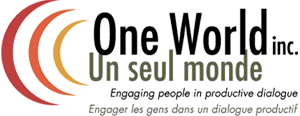Solving Problems Through Meaningful Dialogue

Identifying problems. Exploring issues and options. Making decisions. Sounds pretty much like what every successful organization does every day to address challenges and find a resolution to tricky problems. Whether you’re the CEO of a fortune 500 or managing the day-to-day activities of a not-for profit in your home town, the actual steps of identifying, exploring and resolving problems is usually the same. While that may be true, when confronted with tough issues and critical decisions, using the right kind of process to work through these steps is vitally important to ensure that decisions are arrived at in the most informed way for everyone involved. Assistance from a competent facilitator can greatly improve this process and ensure that the kind of meaningful dialogue that will lead to the most effective and efficient decision-making can take place.
Meaningful Dialogue
Meaningful conversations, whether aimed at creating alternatives, outlining costs and benefits or resolving conflict, takes place daily. Employees, clients, stakeholders and customers interact to share information, identify problems and resolve complex organizational issues. But true dialogue between people who may be impacted upon or can help inform good decisions doesn’t always occur and if it does, it isn’t always well coordinated and captured. During a well facilitated meeting or event, participants are engaged, and the right kinds of methods used to ensure that they are able contribute valuable pieces to the puzzle. Getting relevant people engaged and moving them towards meaningful dialogue is the first step in helping to resolve complex problems and moving the organization forward.
A facilitated process ensures the questions you’re asking are clear, concise and designed to get the responses you need to make an informed decision. Larger groups often benefit from using a mixture of discussion formats such as dividing into smaller “break out” groups that can allow for deeper conversations and full engagement of all. The right facilitator designs and leads process, keeps participants on topic, connects related issues and comments, helps identify and summarize emerging “common ground” or consensus, and guides the group towards final decisions and, if relevant next steps. Overall, a facilitated process makes it easier for groups to move towards meaningful dialogue and achieve a common goal.
Preparation and The Facilitation “Script”
In many if not most cases the preparation for a facilitated process is as important as the process itself. The facilitator works closely with the client to understand the issue, the participants and the ultimate goal. They then develop the agenda and the facilitation “script”, which maps out in detail the overall event or meeting – using the most appropriate facilitation methodologies and tools. They also prepare any session support resources like small group discussion questions and guidelines. If particular information about the problem at hand must be conveyed in order for everyone involved to be able to participate effectively, the facilitator helps identify and package this information and prepare any resource persons who may assist with the session. They also ensure that the outcomes of the meeting will be accurately captured, for example that note-taking is clear, consistent and relevant.
Achieving Desired Outcomes: Roll Out and Evaluate
A facilitator can fill many gaps in the design and roll-out of a problem solving meeting or event. They invariably play multiple roles to ensure that meaningful engagement and dialogue amongst key players can happen – from expert advisor, to process designer, neutral third party moderator/facilitator and coach. They are key to ensuring strong coordination and the most efficient and effective process that will achieve the best decisions and desired outcomes. Once the event has concluded, a facilitator will also assist in capturing the results of the process, for example contributing to production of a final report. They will also work with the client to collect and assess feedback on the event to both verify if goals were met and outcomes achieved and to capture important “lessons learned” that will help future such efforts moving forward.
Regardless of organizational size or mandate, a well facilitated process is beneficial for helping guide meaningful dialogue between employees, stakeholders and others. From helping design presentations and creating core questions, to managing discussion and evaluating feedback and outcomes, a facilitator can have a major impact in the overall effectiveness of any important event or decision-making process.
